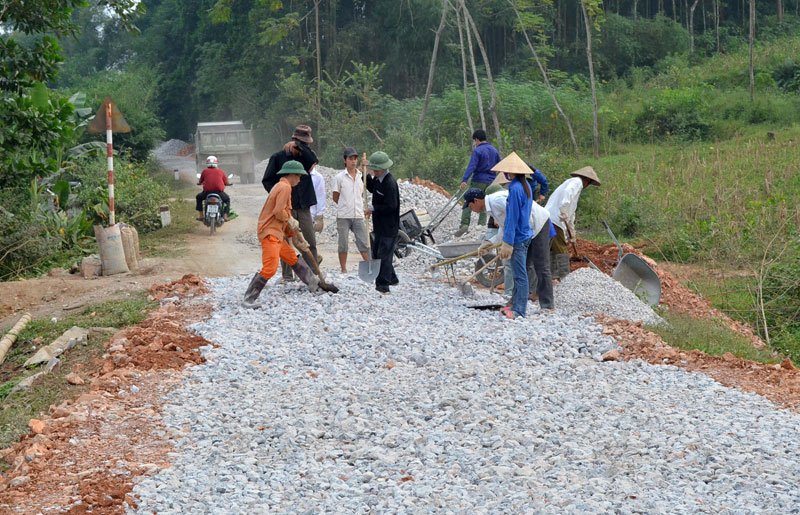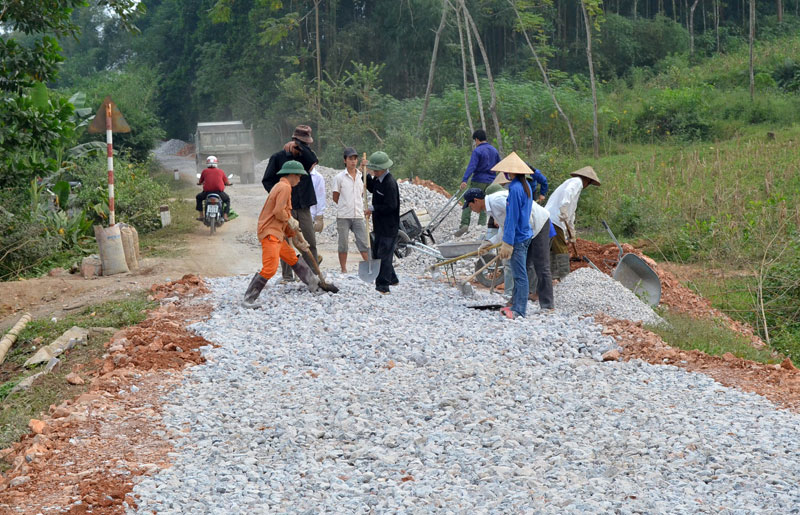
(HBO) - "The Department of Transport has implemented Directive No. 05/CT-UBND issued on March 8, 2017, by the Chairman of the Hoa Binh People's Committee on strengthening the management of the construction investment sourced from the provincial budget for public investment. As a result, traffic projects invested by the local Transport Department have been implemented in accordance with the law, ensuring the construction progress and quality without causing debts. The projects produce good outcomes," said Bui Duc Hau, deputy director of the Transport Department.

Thanks to the effective
management of the transport sector, the provincial road No 448 project (Bai
Chao - Du Sang, Kim Boi) has to date maintained its schedule and ensured
quality.
Since 2017, the Transport
Department has been assigned to manage six transport projects. A report by the
department said in general, the projects are on schedule. The Suoi Hoa bridge and
Provincial Road 433 projects were completed and put into operation. The
remaining projects are running smoothly. In order to ensure the effective
implementation of these projects, the department asked relevant units to keep
an eye on their progress and quality. At the same time, they were required to
urge contractors on mobilizing machinery, equipment and human resources and
applying technology solutions to ensure the quality of the construction.
Those contractors who
delay their projects and violate contract terms will be seriously dealt with
according to the law.
The department has previously
instructed relevant offices to fully implement State bidding regulations, such
as publicly posting full information on bidding newspapers and the national
bidding network, as well as telephone numbers and addresses for feedback; and intensifying
the inspection and supervision of bidding activities to promptly detect and
handle violations./.
According to data from the Hoa Binh Provincial Party Committee, the industrial production index for the first six months of 2025 is estimated to have increased by 20% compared to the same period last year. This marks the highest year-on-year growth rate for this period since 2020.
In the first six months of 2025, Hoa Binh province’s export turnover was estimated at 1.145 billion USD, marking an 18.11% increase compared to the same period in 2024. Import turnover was estimated at $ 804 million, a 17.15% increase, which helped the province maintain a positive trade balance.
The lives of the ethnic minority farmers in Tan Lac district have gradually improved thanks to the new directions in agricultural production. This is a testament to the collective strength fostered through the professional associations and groups implemented by various levels of the district’s Farmers’ Union.
With the motto the "product quality comes first,” after nearly one year of establishment and operation, Muong village’s Clean Food Agricultural and Commercial Cooperative, located in Cau Hamlet, Hung Son Commune (Kim Boi district), has launched reputable, high-quality agricultural products to the market that are well-received by consumers. The products such as Muong village’s pork sausage, salt-cured chicken, and salt-cured pork hocks have gradually carved out a place in the market and they are on the path to obtaining the OCOP certification.
In the past, the phrase "bumper harvest, rock-bottom prices" was a familiar refrain for Vietnamese farmers engaged in fragmented, small-scale agriculture. But today, a new spirit is emerging across rural areas of Hoa Binh province - one of collaboration, organisation, and collective economic models that provide a stable foundation for production.
Maintaining growing area codes and packing facility codes in accordance with regulations is a mandatory requirement for agricultural products to be eligible for export. Recently, the Department of Agriculture and Environment of Hoa Binh province has intensified technical supervision of designated farming areas and packing facilities to safeguard the "green passport" that enables its products to access international markets.



